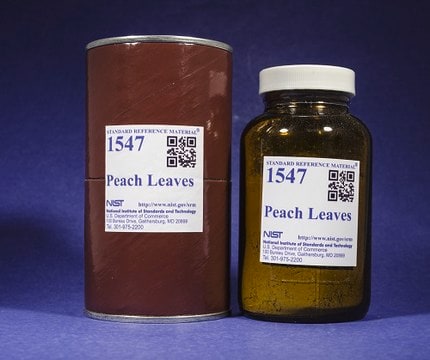NIST1515
Apple leaves
NIST® SRM® 1515
Synonyme(s) :
Apple Leaf Sample
Se connecterpour consulter vos tarifs contractuels et ceux de votre entreprise/organisme
About This Item
Code UNSPSC :
41116107
Nomenclature NACRES :
NA.24
Produits recommandés
Qualité
certified reference material
Niveau de qualité
Conditionnement
pkg of 50 g
Fabricant/nom de marque
NIST®
Format
matrix material
Description générale
This Standard Reference Material (SRM) is intended primarily for use in validating analytical methods for the determination of major, minor, and trace elements in botanical materials, agricultural food products, and similar materials. This SRM can be used for quality assurance when assigning values to in-house control materials. For more information, please refer to the SDS and COA.
SRM 1515_cert
SRM 1515_SDS
SRM 1515_cert
SRM 1515_SDS
Application
- Phytochemical analysis for postharvest disease control: A study explored the phytochemical characterization of forest leaves, including apple leaves, and their application in controlling apple postharvest diseases, highlighting the potential of apple leaf extract in plant-based disease management strategies (Hajji-Hedfi et al., 2024).
- Agrochemical interactions in apple cultivation: Research on the optimization of irrigation and fertilization strategies for apples in arid areas incorporated analysis of apple leaves to assess plant health and nutrient uptake, underscoring the role of natural plant extracts in sustainable agriculture (Duan et al., 2024).
- Screening for disease resistance in apple breeding: An efficient gene screening system from wild apple leaves in response to pathogenic fungi was developed, demonstrating the utility of apple leaf extracts in identifying and harnessing natural resistance traits in plant breeding (Wen et al., 2023).
Autres remarques
Certified for the analytes listed below. See certificate for values and more details
Nitrogen (Total) (N), Phosphorus (P)
Trace Elements:: Aluminum (Al), Boron (B), Barium (Ba), Barium (Ba), Cadmium (Cd), Calcium (Ca), Chlorine, Copper (Cu), Iron (Fe), Lead (Pb), Magnesium (Mg), Manganese (Mn), Mercury (Hg), Molybdenum (Mo), Nickel (Ni), Potassium (K), Rubidium (Rb), Sodium (Na), Strontium (Sr), Vanadium (V), Zinc (Zn)
Matrix Group: Fruits and Vegetables
Nitrogen (Total) (N), Phosphorus (P)
Trace Elements:: Aluminum (Al), Boron (B), Barium (Ba), Barium (Ba), Cadmium (Cd), Calcium (Ca), Chlorine, Copper (Cu), Iron (Fe), Lead (Pb), Magnesium (Mg), Manganese (Mn), Mercury (Hg), Molybdenum (Mo), Nickel (Ni), Potassium (K), Rubidium (Rb), Sodium (Na), Strontium (Sr), Vanadium (V), Zinc (Zn)
Matrix Group: Fruits and Vegetables
Informations légales
NIST is a registered trademark of National Institute of Standards and Technology
SRM is a registered trademark of National Institute of Standards and Technology
Produit(s) apparenté(s)
Réf. du produit
Description
Tarif
Code de la classe de stockage
13 - Non Combustible Solids
Classe de danger pour l'eau (WGK)
WGK 3
Point d'éclair (°F)
Not applicable
Point d'éclair (°C)
Not applicable
Faites votre choix parmi les versions les plus récentes :
Certificats d'analyse (COA)
Lot/Batch Number
Désolés, nous n'avons pas de COA pour ce produit disponible en ligne pour le moment.
Si vous avez besoin d'assistance, veuillez contacter Service Clients
Déjà en possession de ce produit ?
Retrouvez la documentation relative aux produits que vous avez récemment achetés dans la Bibliothèque de documents.
Les clients ont également consulté
Multi-elemental speciation analysis of barley genotypes differing in tolerance to cadmium toxicity using SEC-ICP-MS and ESI-TOF-MS.
Persson P D, et al.
Journal of Analytical Atomic Spectrometry, 21(10), 996-1005 (2006)
Valfredo Azevedo Lemos et al.
Journal of hazardous materials, 159(2-3), 245-251 (2008-03-21)
A new, simple and versatile cloud-point extraction (CPE) methodology has been developed for the separation and preconcentration of copper and nickel. The metals in the initial aqueous solution were complexed with 2-(2'-benzothiazolylazo)-5-(N,N-diethyl)aminophenol (BDAP) and Triton X-114 was added as surfactant.
Notre équipe de scientifiques dispose d'une expérience dans tous les secteurs de la recherche, notamment en sciences de la vie, science des matériaux, synthèse chimique, chromatographie, analyse et dans de nombreux autres domaines..
Contacter notre Service technique







